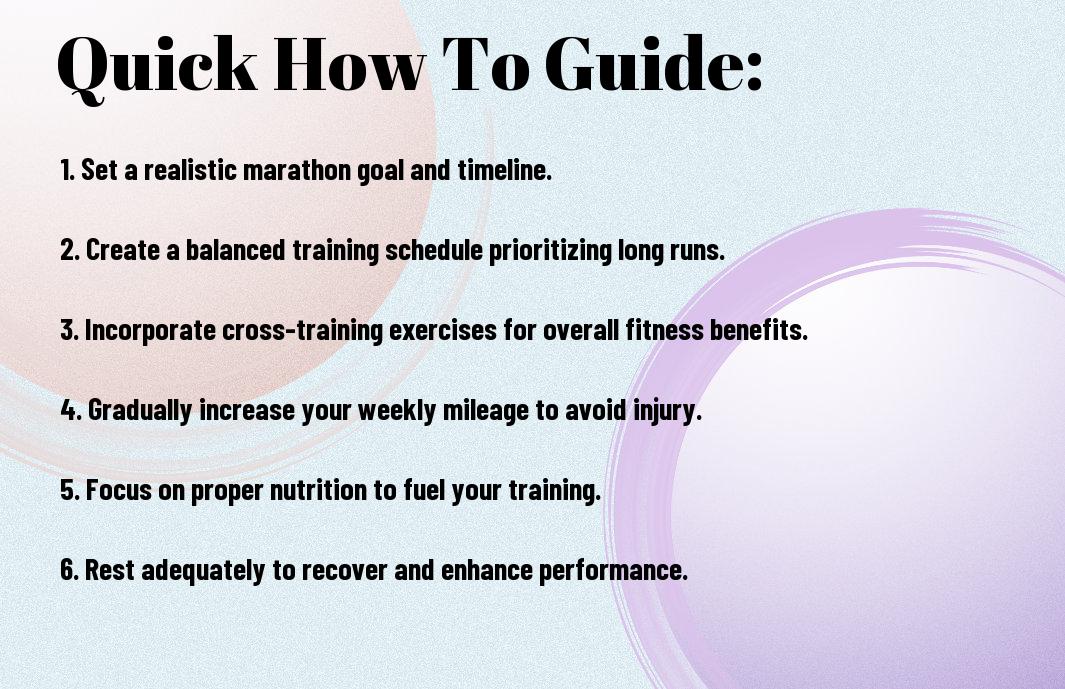There’s a sense of achievement that comes with completing a marathon, and you can reach that goal with the right training plan. This step-by-step guide will provide you with crucial tips and strategies to effectively prepare your body and mind for the 26.2-mile challenge ahead. Whether you’re a seasoned runner or a novice, you’ll find valuable insights on building endurance, scheduling training sessions, and nourishing your body for peak performance. Lace up your shoes and let’s begin on this journey together!
Key Takeaways:
- Begin with a Plan: Develop a comprehensive training plan that outlines your running schedule, including the increase of mileage over time.
- Build Endurance: Focus on long runs to gradually enhance your stamina, aiming for at least one long run each week.
- Incorporate Cross-Training: Engage in complementary activities such as cycling, swimming, or strength training to boost overall fitness and reduce the risk of injury.
- Pace Yourself: Practice running at different paces; knowing how to manage your speed during the race is imperative for your performance.
- Listen to Your Body: Pay attention to signs of overtraining or fatigue, and ensure adequate rest and recovery days to prevent injuries.
Understanding the Marathon
Your journey towards completing a marathon begins with a solid understanding of what a marathon entails. This 26.2-mile race is not just a test of physical endurance but also demands mental fortitude, strategic training, and careful preparation. Understanding the marathon’s structure, distance, and unique challenges will help you set realistic goals and maintain motivation as you progress through your training regimen.
What is a Marathon?
Marathon is a long-distance running event covering 26.2 miles, or 42.195 kilometers. Originating from the legendary run of Pheidippides in ancient Greece, marathons have become a popular athletic challenge worldwide. These races vary, with options for road, trail, and even virtual formats, bringing together runners of all skill levels for a shared pursuit of accomplishment.
Physical and Mental Requirements
Marathon training requires a blend of physical endurance and mental toughness. Physically, you need to build cardiovascular strength and muscular endurance through consistent running and cross-training. Mentally, preparing for the complexities of a marathon includes developing a positive mindset, setting achievable goals, and honing your ability to cope with discomfort while keeping your motivation high.
Understanding the physical and mental requirements necessary for marathon training is key to your success. On the physical side, you’ll engage in long runs, interval training, and strength workouts, gradually increasing your mileage to build stamina. Mentally, you’ll face challenges such as fatigue, self-doubt, and the inevitable “wall” during races. Developing strategies for visualization, maintaining a supportive social circle, and focusing on your goals will help you overcome these hurdles, ultimately leading to a rewarding marathon experience.

Setting Your Goals
Some of the most important steps in preparing for a marathon involve setting achievable and realistic goals. Consider what you want to accomplish—whether it’s simply finishing, achieving a specific time, or even qualifying for a more competitive race. For an in-depth approach, check out The 26.2 Step Guide to Your First Marathon, which can help you align your goals with effective training strategies.
Determining Your Finish Time
If you have a specific finish time in mind, it’s crucial to assess your current running ability and race experience. Look at your previous race times or use a recent 5K or 10K time to estimate a realistic marathon finish time with the help of various online calculators.
Creating a Training Timeline
Time management is key to marathon training. You need to create a timeline that spans several months, ideally 16 to 20 weeks, depending on your fitness level. This time should include gradual increments in mileage and specific training runs, such as long runs and speed work.
A well-structured training timeline will help you build endurance and strength while allowing for recovery periods. Start with a solid base, then gradually increase your weekly mileage with a mix of easy runs, tempo runs, and long runs. Incorporate rest days to let your body recover, and don’t hesitate to adjust your timeline as needed to suit your individual progress and needs.
Essential Training Factors
Once again, focusing on crucial training factors can tremendously improve your marathon performance. As you build your regimen, consider these key elements:
- Consistency in your training schedule
- Gradual mileage increase
- Proper nutrition and hydration
- Rest and recovery days
- Listening to your body
The combination of these factors will prepare you for race day.
Building Endurance
Essential to your marathon preparation, building endurance enables your body to sustain longer distances. Incorporating long runs into your weekly routine will gradually increase your stamina. Aim to extend your longest run each week by no more than 10%, allowing your muscles and joints to adapt. This commitment to endurance training will form a solid foundation for your overall marathon success.
Incorporating Speed Work
Even as you focus on endurance, adding speed work will enhance your overall running efficiency. This approach not only helps improve your pace but also strengthens your cardiovascular capacity. A balanced training plan will include tempo runs, intervals, and hill workouts to target various muscle groups and challenge your limits.
Training for a marathon involves blending endurance and speed to create a dynamic regimen. Incorporating speed work like 400-meter sprints or tempo runs once a week will push your limits while maximizing your time on the road. This type of training should be strategically placed amid your longer runs, ensuring you maintain your stamina while gradually increasing your pace. By keeping your workouts varied and challenging, you’ll find yourself racing more effectively and confidently on marathon day.

Nutrition and Hydration Tips
Now, focusing on nutrition and hydration is vital for your marathon training. Fueling your body properly will optimize your performance and recovery. Consider these tips:
- Consume a balanced diet rich in carbohydrates, proteins, and healthy fats.
- Stay hydrated by drinking water consistently throughout the day.
- Incorporate electrolyte-rich drinks, especially during long runs.
- Experiment with gels or chews during training to find what works best for you.
Perceiving your nutrition and hydration as a foundation for success will help you reach your marathon goals.
Pre-Training Nutrition
If you want to set yourself up for effective training, prioritize your pre-training nutrition. Aim for a meal or snack that is high in carbohydrates and moderate in proteins about one to three hours before your runs. Foods like oatmeal, bananas, or a slice of whole-grain toast can provide the energy needed for a solid training session. This will help fuel your workouts while minimizing the risk of gastrointestinal issues.
Race Day Nutrition
You should start your race day with a nutritious breakfast that includes easily digestible carbohydrates. Ideal options are bagels, cereal, or energy bars, consumed about 2-3 hours before the marathon. Hydration is equally vital; drink water or an electrolyte drink to ensure you’re well hydrated before starting.
To maximize your energy during the marathon, plan to consume additional carbohydrates at regular intervals throughout the race. Depending on your experience, this could mean consuming gels, chews, or even bananas from supporters along the route. Aim for about 30-60 grams of carbohydrates per hour after the first hour of running, as your body benefits from this steady fuel supply. Balancing hydration and nutrition will keep you energized and focused during the race, ultimately contributing to a successful marathon experience.
Injury Prevention and Management
To ensure a successful marathon training experience, adopting proper injury prevention methods is vital. Prioritize building strength through cross-training, incorporating flexibility exercises, and practicing proper running techniques. Establish a pre- and post-run routine that includes warm-ups and cool-downs to minimize injury risk. Listening to your body is imperative; if you feel discomfort, take the necessary steps to address it early on.
Common Marathon Injuries
If you’re training for a marathon, understanding common injuries can help you stay ahead of potential setbacks. Runners often face issues such as shin splints, IT band syndrome, plantar fasciitis, and Achilles tendinitis. Recognizing symptoms early allows you to take the right action before they escalate.
Tips for Recovery
Some effective recovery tips can help you bounce back after intense training. Focus on these strategies to support your recovery process:
- Stay hydrated and maintain balanced nutrition.
- Incorporate rest days into your training schedule.
- Try massages or foam rolling for muscle recovery.
- Utilize ice baths or contrast baths post-run.
Thou will find that prioritizing recovery enhances your performance and overall well-being.
Injury often arises from neglecting recovery. To mitigate the risk, consider maintaining a consistent routine and listening to your body’s needs. Here are some additional tips to enhance your recovery:
- Implement active recovery days with low-impact activities.
- Keep a training log to track your workouts and any discomfort.
- Consult a professional if pain persists or worsens.
- Use compression gear as needed during recovery.
Thou shall see improved results through attention to recovery and prevention.
The Tapering Process
All marathon training culminates in the tapering process, where you reduce your mileage to optimize performance on race day. This phase is vital for allowing your body to recover from the intensity of training, replenishing energy stores, and repairing any minor injuries. A well-planned taper can enhance your physical and mental readiness, ensuring that you feel fresh and strong as you approach the starting line.
Importance of Tapering
Now is the time to focus on tapering, as it plays a significant role in your ability to perform well during the marathon. By decreasing mileage while maintaining intensity, you help your muscles recover and get the rest they need to perform at their best. Tapering also helps in mentally preparing you to face the race confidently, knowing you’ve put in the hard work and allowed ample time for recuperation.
Final Preparations
If you’re nearing the end of your training cycle, the final preparations are important to your success. This includes adjusting your nutrition, planning logistics for race day, and ensuring all your gear is ready. Commit to a consistent routine, prioritize sleep, and keep your mental focus sharp as you approach race day. These small adjustments can make a significant difference in how you feel on the big day.
Process your final preparations by creating a checklist for race day importants such as your running shoes, hydration, nutrition, and attire. Organize your travel plans, including starting and parking locations, so you arrive stress-free. In the days leading up to the marathon, prioritize staying hydrated, eating balanced meals, and resting to give your body the best chance to perform optimally. Establishing a clear plan will help mitigate pre-race nerves and promote confidence as you prepare to take on the challenge ahead.
Summing up
With these considerations, you are now equipped to launch on your marathon training journey. By setting a realistic plan, incorporating diverse workouts, prioritizing nutrition, and focusing on recovery, you can enhance your performance and enjoyment of the race. Stay consistent, listen to your body, and maintain a positive mindset, as these elements will contribute to your success on the big day. Enjoy the process, and embrace every mile as an opportunity to grow as a runner.
Q: What is the ideal duration for a marathon training program?
A: Most marathon training programs span between 16 to 20 weeks. This duration allows runners to gradually build their mileage and increase their endurance without overwhelming their bodies. A longer training cycle is especially beneficial for beginners, as it provides ample time to adapt to longer runs and includes necessary rest periods to prevent injuries. For experienced runners aiming to improve their time, a slightly shorter program of 12 to 14 weeks may suffice, focusing more on speed work and specific training sessions.
Q: How should I structure my weekly training schedule?
A: A well-rounded marathon training schedule typically includes a mix of long runs, easy runs, speed work, and rest days. A sample weekly structure might look like this:
– Monday: Rest day or cross-training (such as cycling or swimming)
– Tuesday: Short, easy run (3-5 miles)
– Wednesday: Speed work (intervals or tempo runs)
– Thursday: Medium long run (5-8 miles at a comfortable pace)
– Friday: Rest day
– Saturday: Long run (starting from 8 miles and gradually increasing to 20 miles leading up to race day)
– Sunday: Recovery run or cross-training.
This structure balances different types of workouts to improve overall fitness while allowing for recovery time.
Q: What are some tips for fueling during marathon training?
A: Proper fueling is imperative for marathon training. During long runs, it’s important to consume carbohydrates to maintain energy levels. Here are some tips:
– Hydration: Drink water regularly and consider electrolyte-replenishing drinks for runs over 90 minutes.
– Carbohydrate intake: Use energy gels, chews, or sports drinks that provide quick energy during long runs. It’s advisable to test these products during training to see what works best for your stomach.
– Pre-run meal: Eat a balanced meal rich in carbohydrates 2-3 hours before long runs, with moderate protein and minimal fat.
– Post-run nutrition: Refuel within 30-60 minutes after a run with a mix of carbohydrates and protein to aid recovery.
By practicing nutrition strategies during training, you can be better prepared for race day and avoid digestive issues.

